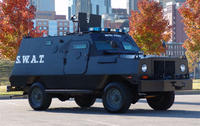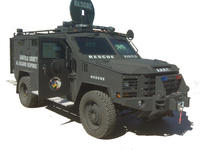-
New York governor determined to close Indian Point nuclear plant

The Indian Point nuclear power plant, located thirty-five miles north of New York City, is facing increasing pressure from Governor Andrew Cuomo and senior officials say the governor is determined to shut it down; the governor’s hand has been strengthened by new legislation that streamlines the approval process for siting new power plants in New York, a move that would make it easier to replace Indian Point; closing the nuclear plant would be a major step toward reshaping the state’s energy policy as the plant produces 2,000 megawatts and provides New York City and Westchester with 25 percent of their power — but the nuclear disaster in Japan caused by the 11 March earthquake and tsunami raised fresh concerns about the plant, which is located near a fault line
-
-
Butte County police lobbies for armored vehicle

For the second year in a row local law enforcement officials in Butte County, California are rallying to obtain grant money to help purchase an armored vehicle; if money from 2011 DHS grants is allocated to Butte County by the state, officials say it would be used to purchase an armored vehicle for the Butte County Sherriff’s Office and Chico
-
-
New Haven, Connecticut police begin installing security cameras
New Haven police plan to install twenty-one surveillance cameras in the city’s hot spots for crime. The cameras will give officers a 360 degree view of an area’s streets and sidewalks; police hope that the cameras will help reduce New Haven’s rising violent crime rate; in the first half of 2011, more than eighteen people have been killed
-
-
Federal judge blocks Georgia's Arizona-style immigration law
On Monday, portions of a Georgia immigration law were blocked by a federal judge on the grounds that the role of enforcing immigration was a federal responsibility; under the law, all businesses in Georgia would be required to check the immigration status of all new hires, police officers would be able to verify the immigration status of anyone unable to provide proper identification during a routine stop, and it would be illegal for anyone to knowingly or willingly transport illegal aliens
-
-
Lawmakers introduce raft of border security bills
Border security continues to be a hot political issue, and lawmakers of both houses and both parties introduce a raft of new border security-related bills; the bills range from a measure to establish health care services along the U.S.-Mexico border to a proposal to educate border patrol agents about child trafficking to a bill calling for compensation to border counties for high level of undocumented aliens relying on county services
-
-
SWAT Team in Washington acquires heavily armored vehicle

The Tri-City Regional SWAT Team in Tacoma, Washington recently received a major boost to its arsenal of crime fighting tools;thanks to DHS grants, the Tri-City Regional Swat Team was able to purchase the BearCat, a $292,000 armored personnel carrier; the vehicle is heavily armored and is capable of stopping .30-caliber ammunition
-
-
Connecticut fire departments receive $270,000 in DHS grants
On Friday, Connecticut Senators Joe Lieberman and Richard Blumenthal announced that the New London Fire Department would receive a DHS grant for more than $15,000, while the Oakdale Volunteer Fire Department would receive over $260,000 in DHS funds
-
-
New Jersey lawmakers protest transit security cuts
On Tuesday Senator Frank Lautenberg (D-New Jersey) and Representative Rush Holt (D-New Jersey) urged lawmakers to restore funding for security measures to the nation’s railways; the House budget would cut funding for nine homeland security programs by 55 percent next fiscal year; in particular, funding to secure intercity passenger rail lines, freight trains, and mass transit systems would fall to $113 million down from $250 million, a 45 percent cut
-
-
New Jersey Transit unveils new terror text hotline
NJ Transit recently unveiled its new “Text Against Terror” initiative and is encouraging public transportation riders to report any suspicious items they see via text; the New Jersey transit system is the third largest in the nation with an estimated one million riders per day; New Jersey Transit officials are hoping to enlist the aid of its passengers in the fight against terror.
-
-
Hattiesburg, Mississippi receives $13,000 DHS grant
Hattiesburg, Mississippi recently received a DHS grant for $13,789 to purchase search and rescue equipment; the grant was awarded by the Mississippi Office of Homeland Security and comes as part of a $200 million DHS grant program designed to bolster emergency management and preparedness capabilities at the state, local, and community level
-
-
N.Y. Dems push for gun microstamping legislation
New York legislators are pushing for new gun technology that could help law enforcement officials fight crime; microstamping is a new technique that stamps a code on shell casings ejected when a gun is fired; the code can provide valuable information like the dealer who sold it and the buyer who purchased it; this week marks the end New York’s current legislative session and Democratic lawmakers are pushing to get the Republican controlled Senate to take up a bill that would require guns in New York to be microstamped
-
-
Massachusetts firefighters purchase chemical fire equipment
Local firefighters in Massachusetts recently received a new foam trailer capable of pumping out 500 gallons per minute; to control chemical fires and other difficult blazes, firefighters often use foam to coat the fuel to deprive the fire of oxygen; the new foam trailer is particularly useful as Ayer is home to several chemical and electrical facilities
-
-
Massachusetts defies feds, rejects Secure Communities

Massachusetts has become the latest state to reject DHS’s Secure Communities program; the state announced it would not sign a memorandum of understanding to participate in the DHS program; Massachusetts is the fourth state to reject Secure Communities in recent weeks; New York, California, and Illinois have all made efforts to reject the program as well; a DHS official said the federal government will force Massachusetts to join the program and that the state has no jurisdiction to opt out
-
-
Sheriffs in Pasco County, Florida to stop crimes before they happen

Local law enforcement officials in Florida are taking a new more proactive approach to fighting crime; last week Pasco County Sheriff Chris Nocco announced that the department would begin implementing what he calls “intelligence-led policing”; under his plan, officers will focus on gathering intelligence and sharing that information with local, state, and federal agencies to stop crimes before they occur; according to Sheriff Nocco 6 percent of offenders commit 60 percent of crimes, and so his department will begin more closely monitoring these individuals; Nocco has requested additional staff to help map crime patterns and share intelligence; critics of the approach are concerned about the notion that police officers are closely monitoring people who have not committed any crimes
-
-
Middlesex County, N.J. gets $1 million for mobile tent system
Local emergency responders in New Jersey recently received a big boost in disaster preparedness from DHS; last week the county unveiled a new 3,000 square foot mobile structure comprised of interlocking tents and trailers; the tents can be quickly set up to treat victims of a radiological accident, terrorist attack, pandemic, or weather emergency; the tent system can also be outfitted with its own water supply, power generator, and heating and cooling systems. They are even equipped with lights, showers, sinks, and a kitchen; for training purposes, the tents were set up at the Middlesex County College campus; the portable structure, called the Gatekeeper system, cost $1 million and was paid for with DHS grant money; county officials also received DHS grants to purchase mobile radiation detection devices for police officers; the tents and the radiation detectors come as part of a broader government effort to prepare local law enforcement agencies within a forty-five mile radius of New York City for a dirty-bomb attack
-
More headlines
The long view
Smaller Nuclear Reactors Spark Renewed Interest in a Once-Shunned Energy Source
In the past two years, half the states have taken action to promote nuclear power, from creating nuclear task forces to integrating nuclear into long-term energy plans.
